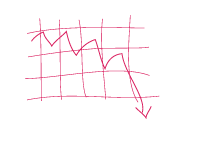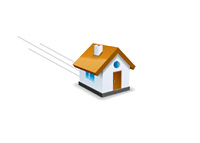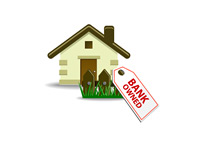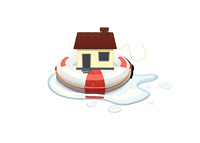S+P/Case-Shiller Paints Glum Picture of US Housing Market
 The US economy may finally be starting to stabilize, but the US housing market has not.
The US economy may finally be starting to stabilize, but the US housing market has not. According to the newest S+P/Case-Shiller home-price index that was released on Tuesday, home prices fell 1% in December (from November) across 20 major metropolitan areas in the United States.
Of the 20 major metropolitan areas that are included in the S+P/Case-Shiller home-price index, 11 markets hit their lowest levels seen since home prices peaked back in 2006/2007. Those markets were:
Atlanta
Charlotte
Chicago
Detroit
Las Vegas
Miami
New York
Phoenix
Portland (Oregon)
Seattle
Tampa
18 of the 20 cities included in the index were down from the fourth quarter of 2009, with only San Diego (+1.7%) and Washington, DC (+4.1%) posting higher average home values over the year before.
The US National Home Price Index fell by 3.9% in Q4/2010 and was down 4.1% from the fourth quarter of 2009.
According to a press release that was circulated earlier today, the S+P/Case-Shiller home-price index is currently "within a percentage point of the low it set in the first quarter of 2009." The press release also noted that 19 of the major metropolitan areas that are included in the index were down in December from November, with only Washington DC posting a gain.
The Q4 report also notes that Cleveland and Las Vegas now have the "dubious" distinction of having average home prices that are below their January 2000 levels.
--
Despite the fact that people are starting to feel more optimistic about the US economy, home values are still dropping in many areas across the country.
There are a number of reasons for this trend.
To start, there is still massive oversupply mainly due to a large number of foreclosures that are still choking the market. Until the number of bank-owned properties starts to meaningfully drop, the US real estate market is not going to make a solid recovery.
In addition, many people are currently underwater on their mortgages and do not want to sell (or can't afford to), even if it means saying no to a new job opportunity. In the past, people could have sold their homes and moved across the country to take a new job. These days, many people are simply stuck in their homes because they owe more than what the house of worth. Selling is just not an option for many Americans right now.
The high unemployment rate is obviously weighing on the market as well. It's pretty tough for the real estate market to rebound to the upside when the national unemployment rate is currently sitting at 9%.
On top of all of that, many willing buyers are simply not willing to step in and buy right now. Can you blame them? What's to say that home values won't drop 10-20% over the near-term in the city that they were thinking about buying in? Many people are just afraid to pull the trigger on a home buy right now, and for very good reason.
--
Based on the data included in the S&P/Case-Shiller home price index, it appears as though the US real estate market is in the midst of a double-dip.
Source: S+P/Case-Shiller Home Price Indices
Filed under: Real Estate News



